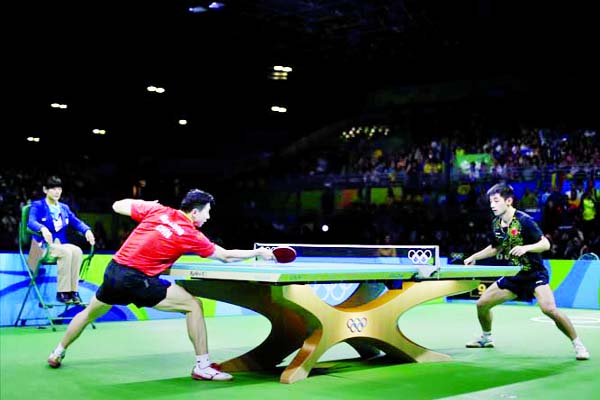
AP, Rio De Janeiro :
The world champion beat the defending champion to win Olympic table tennis gold.
Not surprisingly, both were from China.
Ma Long, the top-ranked player in the world, defeated teammate Zhang Zike in the men’s final Thursday, winning four straight games to sweep the best-of-seven series 4-0.
Ma came into the tournament as the favorite, and the pressure was heightened by facing the older Zhang, a veteran known for showing up for big matches. But the gold-medal match was all Ma, who made a heart shape with his hands and smiled broadly after the last point.
The win continued China’s domination of table tennis. On Wednesday, Ding Ning won the women’s gold medal by beating teammate Li Xiaoxia, the defending champion from London.
Despite a tentative early start in the men’s final, with short points that often ended in an error or a decisive smash, Ma began to build confidence. As both players settled in, the rallies began to get longer, each man sending lighting fast backhand and forehand exchanges careening toward each other, the ball sometimes seeming to vanish in a blur of speed and power.
During the long rallies, they slowly backed away from the table, crouching low but never slowing the speed of the ball. Although he showed flashes of brilliance, it was usually Zhang with the errors, and he looked visibly frustrated, shaking his head as the points mounted for Ma.
China has won all but four gold medals since table tennis became an Olympic sport in 1988 – and all the golds at the past two games. If its men and women can take the team titles, as expected, they will have swept gold in Rio de Janeiro, too.
Ma’s victory marks the third straight Olympics where Chinese men have taken both gold and silver. Chinese women have won every Olympic gold medal in table tennis.
The world champion beat the defending champion to win Olympic table tennis gold.
Not surprisingly, both were from China.
Ma Long, the top-ranked player in the world, defeated teammate Zhang Zike in the men’s final Thursday, winning four straight games to sweep the best-of-seven series 4-0.
Ma came into the tournament as the favorite, and the pressure was heightened by facing the older Zhang, a veteran known for showing up for big matches. But the gold-medal match was all Ma, who made a heart shape with his hands and smiled broadly after the last point.
The win continued China’s domination of table tennis. On Wednesday, Ding Ning won the women’s gold medal by beating teammate Li Xiaoxia, the defending champion from London.
Despite a tentative early start in the men’s final, with short points that often ended in an error or a decisive smash, Ma began to build confidence. As both players settled in, the rallies began to get longer, each man sending lighting fast backhand and forehand exchanges careening toward each other, the ball sometimes seeming to vanish in a blur of speed and power.
During the long rallies, they slowly backed away from the table, crouching low but never slowing the speed of the ball. Although he showed flashes of brilliance, it was usually Zhang with the errors, and he looked visibly frustrated, shaking his head as the points mounted for Ma.
China has won all but four gold medals since table tennis became an Olympic sport in 1988 – and all the golds at the past two games. If its men and women can take the team titles, as expected, they will have swept gold in Rio de Janeiro, too.
Ma’s victory marks the third straight Olympics where Chinese men have taken both gold and silver. Chinese women have won every Olympic gold medal in table tennis.

